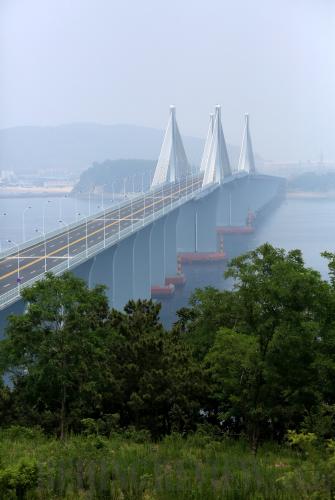|
 |
|
A NEW LANDMARK: Changshan cross-sea bridge in Dalian, northeast China's Liaoning Province, will open to traffic in July (ZHANG CHUNLEI) |
Subsidy Ends
China is moving to replace its decades-old agricultural subsidies with a more flexible pricing mechanism, as domestic harvests in the world's largest grain importer are expected to see their 11th consecutive year of growth.
Experts say the change will not endanger food security nor result in steep price drops in major agricultural products.
Decisions to scrap the minimum purchasing price for rice, the temporary storage policy for soy and cotton and other agricultural subsidy policies were made on June 25 at a State Council executive meeting led by Premier Li Keqiang.
Under the new policy, the government will set up a target price for each kind of major agricultural product. Farmers will receive subsidies from the government when the market price is below the target, and low-income groups will also receive subsidies when the market price sours.
The reform, which aims to restore a market-oriented pricing mechanism, as domestic grain prices are usually above the global price, will be conducted first from selected areas and particular types of agricultural products.
According to a statement released after the meeting, soy and cotton will be first in line to test the concept before the policy is applied to other major agricultural products, such as wheat, rice and corn.
China has gradually set up various subsidy policies since 2004 to shore up grain prices and protect farmers' motivation.
Overseas Expansion
Alipay, China's largest third-party payment service provider run by e-commerce giant Alibaba, announced on June 25 a partnership with the U.S. online payment startup Stripe.
Under the agreement, overseas merchants who use Stripe's payment software can now detect if shoppers are located on the Chinese mainland and give them the option of paying through their Alipay accounts.
The move is expected to be warmly welcomed by Chinese shoppers who are not happy with providing their credit card details to overseas websites but who use Alipay as an alternative payment solution.
Stripe didn't disclose the number of merchants Alipay is cooperating with, but said it now allows online merchants to conduct transactions using 139 currencies and Bitcoin, a virtual currency. It also plans to form more partnerships with popular payment providers in regions where credit cards are not widely used, according to media reports.
Hydroelectric Plant
On June 25, China's Sinohydro signed a deal with Bolivia's Corani Electric Co., an affiliate of the National Electricity Co., to build a hydroelectric plant that will produce an additional 124 megawatts for Bolivia's national power grid, the National Interconnected System.
Bolivia's President Evo Morales said the whole project will be developed in three stages through to 2018, with an estimated investment of $235 million.
"The investment is guaranteed to generate energy for the department and all Bolivia," said Morales.
The government aims to consolidate the nation's electric power infrastructure by 2020, so it can meet domestic demand and generate up to 1,000 extra megawatts for export.
The project includes building a reservoir, a network of roads and three tunnels, among other infrastructure. The plant is expected to be operational by 2018. | 